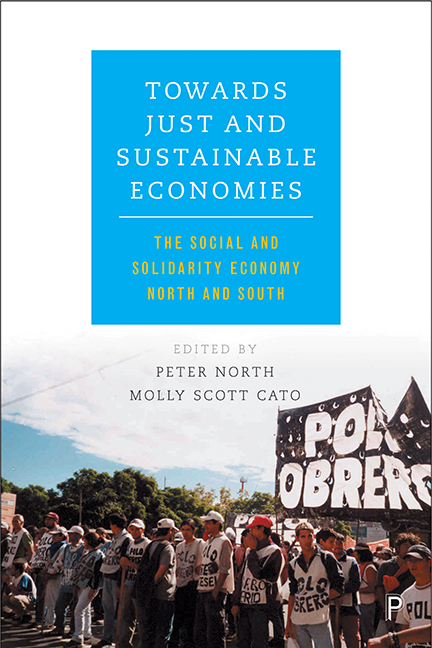Book contents
- Frontmatter
- Dedication
- Contents
- List of figures and tables
- Notes on contributors
- Acknowledgements
- One Introduction: new economies North and South – sharing the transition to a just and sustainable future
- Part I Theoretical perspectives on the social and solidarity economy
- Part II The social and solidarity economy as a site of social innovation
- Part III The social and solidarity economy and the state
- Part IV Policy translation between North and South
- Index
Fifteen - The social and solidarity economy in Argentina and the UK:convergence from opposite directions
Published online by Cambridge University Press: 05 April 2022
- Frontmatter
- Dedication
- Contents
- List of figures and tables
- Notes on contributors
- Acknowledgements
- One Introduction: new economies North and South – sharing the transition to a just and sustainable future
- Part I Theoretical perspectives on the social and solidarity economy
- Part II The social and solidarity economy as a site of social innovation
- Part III The social and solidarity economy and the state
- Part IV Policy translation between North and South
- Index
Summary
Introduction
This chapter explores the commonalities and differences in the history of the development of the social and solidarity economy (SSE) in the UK and Argentina, and in particular how the need for social security and welfare in the 19th century was resolved through mutual organisation in both societies. It discusses how this welfare provision was then absorbed into the state in the UK, while in Argentina it became part of an independent SSE with significant legislative underpinning and political support, particularly from the Peronist Party during the 20th century. In the final stage of comparison, we highlight the unpicking of the welfare state in the UK, which has led to an increased need for voluntary welfare provision, branded as the Big Society, and discuss attempts in Argentina to encourage cooperative entrepreneurism. As well as providing an account of the social function of the SSE, in keeping with a central theme of this collection, the chapter also explores how the need to make a rapid transition to sustainability works alongside the need for social justice to suggest a reciprocal relationship between the development of the SSE in these two societies, North and South.
Although historically the unmet need for social welfare was tackled through mutual organisation in both societies, in the UK social welfare came to be exercised primarily through the state, governed by national legislation on minimum standards and then implemented through local authorities. This led to the heyday of the welfare state for the three decades following the end of the Second World War. In Argentina universal state welfare was the provider of basic needs, such as health and education, complemented by civil society, unions and religious institutions. However, as discussed in more detail later, the politics of austerity – that is, the opportunistic actions of the opponents of state provision to exploit the 2008 financial crisis to achieve their longheld aim of reducing welfare provision – has reduced the differences between North and South, as the scope and depth of payments and services has been reduced, leading to a situation where voluntary and solidarity organisations have been forced to fill gaps that would once have been the responsibility of the state.
- Type
- Chapter
- Information
- Towards Just and Sustainable EconomiesThe Social and Solidarity Economy North and South, pp. 275 - 294Publisher: Bristol University PressPrint publication year: 2017

